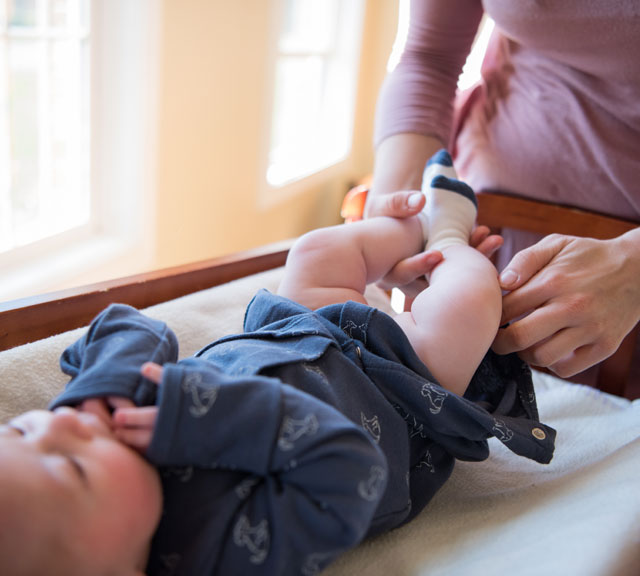What You Need to Know About Circumcision

Find Your Perfect Match
Answer a few questions and we'll provide you with a list of primary care providers that best fit your needs.
Circumcision is a surgical procedure often performed on baby boys within two days after birth. Circumcision removes the skin covering the head of the penis.
You and your partner should decide before the birth if you want to circumcise your baby. There is no right or wrong decision. For most people, religious, social or cultural beliefs are an important part of the decision. Circumcision is common in the United States, Canada, and the Middle East.
While there are some health benefits to circumcision, they are not significant enough for the American Academy of Pediatrics to recommend circumcision as a routine practice.
Be sure to talk with your obstetrician and pediatrician about whether circumcision is right for you and your baby.
The Procedure
If your baby is born in the hospital, your obstetrician or pediatrician will perform the circumcision before you go home, usually the day after your baby is born. The surgery takes between 5 and 20 minutes.
Boys are born with skin that covers the head (glans) of the penis. This is called the foreskin. During circumcision, the foreskin is removed. There are different ways to perform a circumcision, including:
- Plastibell
- Gomco clamp
- Mogen clamp
The doctor first separates the foreskin from the glans with a device or clamp. The doctor uses a scalpel to remove the foreskin.
If you are Jewish, circumcision may take place at your home or at a Jewish center, usually around your baby’s eighth day of life. This is called a “bris” and a Mohel performs it. You and your partner hold your baby while the Mohel completes the procedure. The foreskin is separated from the glans, often using a Mogen clamp. A single cut with a scalpel removes the foreskin.
Circumcision is painful. Babies can be given a local anesthesia or a cream to reduce or block the pain during the procedure. Breastfeeding or feeding helps to comfort your baby and control pain.
Why Do Parents Choose Circumcision?
Parents choose circumcision for social, religious, traditional and health reasons. Some parents choose circumcision because:
- Most men in the family are circumcised
- They don't want their child to look different from other children
As with any surgery, there are risks. You should discuss the pros and cons of circumcision with your obstetrician or pediatrician.
Benefits of circumcision include:
- Prevention of urinary tract infections in infants
- Prevention of penile cancer in adult men
- A reduction in the risk of sexually transmitted diseases, including HIV and AIDS
- Prevention of foreskin infections
- Easier genital hygiene
The rate of complications from circumcision is generally low. Some complications can often be prevented with proper care of the penis after circumcision.
To keep the incision site clean:
- Keep the area clean and dry
- Change diapers often
- Use petroleum jelly to prevent irritation
- Change any gauze bandages frequently
Scabbing, light bleeding and some yellow discharge can occur and is normal. The penis should heal fully in one week to 10 days. Talk with your doctor about manually retracting the skin after the baby goes home to prevent adhesions.
Risks and complications from circumcision include:

- Infection
- Bleeding
- Not enough foreskin removed
- Redness around the tip of the penis that gets worse after three days
- Fever
- Pus-filled blisters or greenish discharge
- Inability to urinate normally six to 8 hours after the procedure
- The Plastibell device does not fall off within seven to 10 days.
Call your doctor if your baby shows any of these symptoms.
Why Do Parents Opt Out?
Parents who decide not to circumcise their sons also often base their choice on medical, social, religious and culture beliefs. Reasons parents choose not to circumcise their baby boys include:
- Fear of the risks. Complications are rare, but can include improper healing and infection.
- Belief that foreskin is needed. Some people believe the foreskin protects the tip of the penis from irritation.
- Belief it can affect sex. Some feel circumcision makes the tip of the penis less sensitive, causing a decrease in sexual pleasure later in life.
- Proper hygiene can lower health risks. Boys can be taught proper hygiene to lower their risk of getting infections, cancer of the penis and sexually transmitted diseases.
There are cases in which circumcision should not be performed. These situations include:
- A penis that is too small
- A history of abnormal bleeding in the family
- A baby with a penis abnormality
The American Academy of Pediatrics supports either choice, whether you circumcise your child or not. You should feel confident that your child will be healthy if you choose not to circumcise.
Find Your Perfect Match
Answer a few questions and we'll provide you with a list of primary care providers that best fit your needs.
Source: American Pregnancy Association; American Academy of Pediatricians

